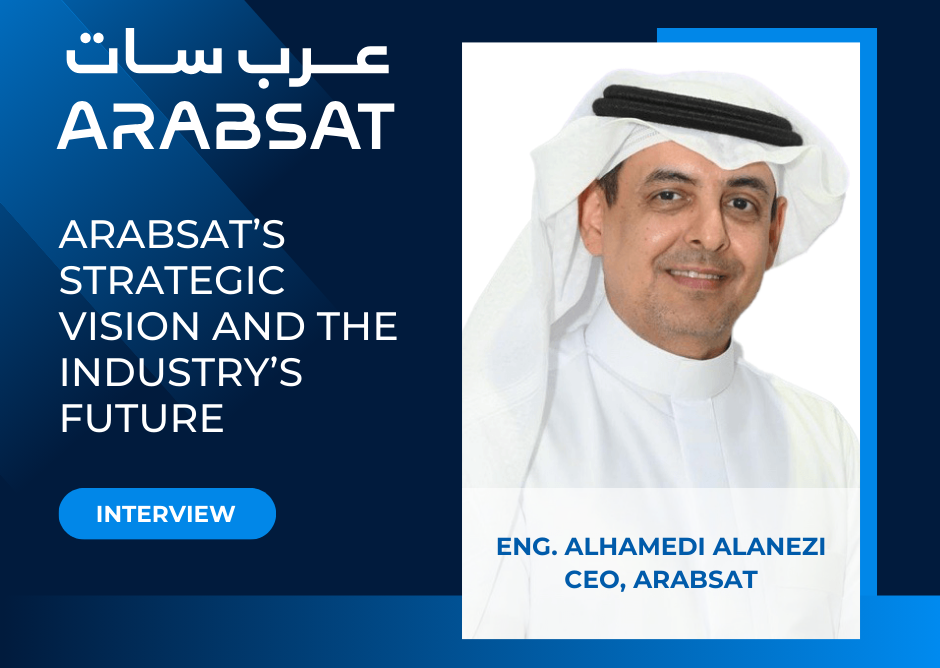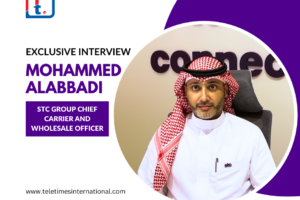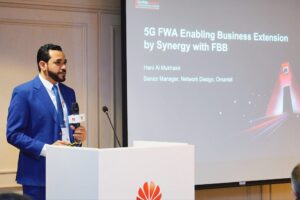Eng. Alhamedi Alanezi – CEO, Arabsat
Exclusive Interview: Gulraiz Khalid
The satellite industry is witnessing a transformative phase, with new technologies, changing customer needs, and increasing competition shaping the market dynamics. In an exclusive interview with the CEO of Arabsat, Eng. Alhamedi Alanezi, we explored the company’s strategic approach, challenges, and the evolving satellite market, as well as the significance of global industry events like IBC for fostering innovation and collaboration.
The Current Landscape of the Satellite Market
The satellite industry is increasingly diverse, encompassing traditional broadcast services, data connectivity, and the rapidly growing Low Earth Orbit (LEO) satellite segment. Arabsat is one of the key players in this market, with a broad focus that includes broadcast, connectivity, managed services and data solutions serving multi orbits. This diversification is crucial as satellite operators contend with the evolving needs of their customers across different regions and sectors.
“We believe that sustainable services should go hand-in-hand with sustainable demand. We’re committed to developing local markets and empowering nations with the necessary infrastructure for growth,” stated the CEO.
Global satellite operators are adapting to a new environment that demands more sophisticated services, including Software-Defined Satellites (SDS) and new partnerships to enhance service capabilities. Arabsat’s CEO pointed out the importance of staying ahead of these changes, emphasizing their proactive approach to integrating new technologies and fostering strategic partnerships.

The Importance of Events Like IBC for Arabsat and the Industry
Events like the International Broadcasting Convention (IBC) serve as pivotal platforms for companies like Arabsat to showcase their latest innovations and network with key industry players. According to Arabsat’s CEO, IBC has become a landmark for broadcast services, providing a venue to connect with clients, partners, and industry stakeholders. The event allows Arabsat to share new services, technologies, and strategies tailored to its diverse coverage region, which includes the Middle East, Africa, and parts of Europe.
For Arabsat, participation in these international exhibitions is more than just showcasing products; it’s about engaging with global trends and establishing the company as a leader in bringing the latest services and solutions to its regional market.
“IBC has become a landmark for the broadcast services, and it is the best among all other activities when it comes to video and broadcast activities across the globe. Our presence at IBC helps us introduce new services, meet with clients, and bring a lot of innovations to the market,” said Eng. Alhamedi Alanezi.
Arabsat’s Current Strategy and Focus Areas
In late 2022 and early 2023, Arabsat launched a new five-year strategic plan focusing on three core pillars:
1. **Broadcast Services:** Arabsat is launching a comprehensive suite of video solutions that covers the entire value chain from live content production, to channel creation, contribution and distribution. Maintaining and enhancing their portfolio to better serve customers with advanced broadcast solutions remains a top priority. Arabsat’s strategy involves adding value through managed services like cloud playout, content cross-promotion, and cultural exchange initiatives that leverage their expansive network of over 600 channels.
2. **Data Solutions and Managed Services:** Arabsat is expanding its footprint in the data solutions market. The focus is on delivering more robust data services to meet the increasing connectivity needs for multi-industries customers in the Middle East and Africa.
3. **LEO Services and Partnerships:** Arabsat is venturing into the LEO satellite segment by partnering with companies like BlackSky for Earth observation and others for IoT services. This strategic expansion aims to position Arabsat as a key player in the LEO space, enhancing its capability to offer advanced services like IoT and Earth observation.
Additionally, Arabsat is integrating Software-Defined Satellites (SDS) into its fleet to offer more flexible and sustainable services. Their next-generation satellites and the newly developed BADR-9, are set to redefine Arabsat’s service capabilities to ensure sustainability and adaptability for future demands.
Key Challenges and Overcoming Them
The satellite industry is fraught with challenges, from high operational costs to the complex task of balancing diverse customer needs. Arabsat faces these challenges by focusing on knowledge dissemination and customer engagement through initiatives like the “Arabsat Advisors” program. This service aims to help clients navigate industry complexities and adopt new services effectively.
A significant part of Arabsat’s mission is supporting regional development through enhanced connectivity and services that cater to a wide range of needs—from educational initiatives in remote areas to disaster response support. The company is also actively involved in regulatory discussions, emphasizing the importance of balanced frequency allocations and advocating for the inclusion of space services in national development strategies.

“Space industry is a very risky and costly industry, and not many have the appetite to go deep into this. With Arabsat Advisors, we’re helping our customers understand and overcome these challenges,” shared the CEO.
Future Outlook and Arabsat’s Role in Developing Markets
Looking ahead, Arabsat aims to play a pivotal role in developing local markets, particularly in Africa. The CEO highlighted the need for a balanced approach that goes beyond commercial interests, advocating for partnerships that prioritize national development. Arabsat is already engaged with several African nations, working on projects that enhance the local satellite and communication infrastructure.
This approach underscores Arabsat’s commitment to building long-term relationships with its partners and customers, supporting not just the commercial viability of satellite services, but also the socioeconomic development of the regions it serves.
The Role of Regulators and Arabsat’s Message
Alhamedi Alanezi recognizes the crucial role that regulatory authorities play in shaping the future of the satellite and space industry. He emphasized that regulators need to strike a balance between supporting national development and maximizing commercial benefits, particularly in regions like Africa, where connectivity needs are high, and infrastructure is still evolving.
“Regulators should play a more active role in promoting space services and recognize them as a national need, not just a commercial one. This will ensure sustainable growth and development in emerging markets like Africa”, Eng. Alhamedi Alanezi.
Arabsat’s CEO urged regulators to consider space services as an integral part of national development strategies rather than relying solely on local commercial operators. He cited successful examples like Mauritania, where regulatory support has enabled robust growth in spite of financial limitations. Arabsat’s CEO also called for more proactive involvement from regulators in promoting space services and making informed decisions on spectrum allocations, especially for 5G and C-band frequencies.
His message is clear: the satellite industry’s success depends on collaboration between regulators, operators, and governments to create an environment conducive to innovation.








